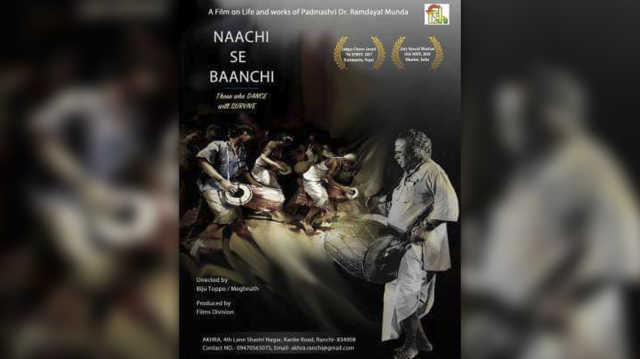
Suyog Zore
Mumbai, 22 Jun 2022 16:24 IST
The 70-minute documentary bagged the Rajat Kamal for the Best Biographical Film at the 65th National Film Awards.

Biju Toppo and Meghnath's Naachi Se Baanchi traces the inspirational journey of the global-yet-rooted revolutionary thinker and educationist Ram Dayal Munda (1939 – 2011), shedding light on his contributions to politics, academia and music.
The 70-minute documentary bagged the Rajat Kamal for the Best Biographical Film at the 65th National Film Awards in 2018.
Munda, who was born in an Adivasi family, brought the indigenous community's problems into the light and fought for its rights at a time when the mainstream media largely turned a blind eye to this section of society.
Apart from helping preserve a traditional way of life, he also contributed to the Jharkhand movement.
The film begins with Munda chanting a traditional mantra in the Mundari tongue where he invokes Karl Marx, Subhas Chandra Bose, Rabindranath Tagore, Martin Luther King, Jaipal Singh Munda and Mahatma Gandhi.
Naachi Se Baanchi then depicts the growth and evolution of Ram Dayal Munda via video recordings, photographs and old interviews.
Before he left for the USA in 1964 for higher education, he didn't even have money to buy clothes, so his relatives arranged for his clothes, a passport and travel fare. After settling down in America he not only made friends but also got married. Later, he taught at the University of Minnesota and took part in the civil rights movement, which left a long-lasting impact and inspired him to do something for his own community.
The documentary features interviews with Munda'a friends from the USA and his first wife who reminisced about his struggles and also shared some sweet memories of playing basketball with him.
On returning to India, he began working for the upliftment of tribal communities. He also started the Department of Tribal and Regional Language at Ranchi University and subsequently became the vice-chancellor of the varsity. His immense contributions to the Jharkhand movement, among other things, earned him the Padma Shri in 2009
Although Munda dedicated his life to the betterment of tribals, he would make time for his true love — music. Poetry and folk music were an important part of Munda's life and he used to play the flute. The filmmakers use his son Gunjan as the narrator, which not only helps add emotional depth to the story but also gives it a unique perspective.
Biju Toppo and Meghnath's documentary intersperses the various facets of its subject, who was a revolutionary and ardent educationist as well as an artist. And though the documentary presents every side of his personality, the narrative never drags.
The title of the documentary, which means 'Those who dance will survive', is perfectly elucidated by Naachi Se Baanchi's filmmakers. It shows how tribals should enjoy themselves and prosper in order to keep their culture alive and triumph over various hurdles.
Naachi Se Baanchi was screened at the 17th Mumbai International Film Festival on 4 June 2022.
Related topics
Mumbai International Film FestivalYou might also like

Review Hindi
Jogi review: Diljit Dosanjh-starrer is more like a thriller revolving around 1984 riots
The Ali Abbas Zafar film takes you by surprise with the riot angle brought in much earlier in the...

Review Hindi
Matto Ki Saikil review: Prakash Jha leads this sentimental saga of socio-economic inequality
Written and directed by M Gani, the Hindi film is a patchy yet heartbreaking look at the bleak class...

Review Hindi
Jhini Bini Chadariya review: A moving lamentation for the holy city of Varanasi
Ritesh Sharma’s hard-hitting film lays bare the social fabric of the city and the growing...
